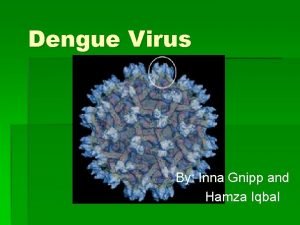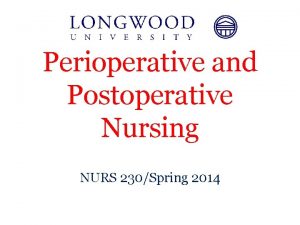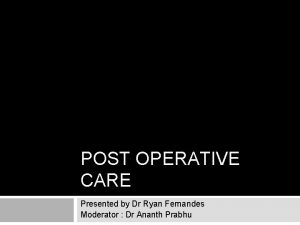Supplemental Power Point Slides Post Dengue Fever Epidural




- Slides: 4

Supplemental Power. Point Slides Post Dengue Fever Epidural abscess with or without Spondylodiscitis—a Case series of 8 patients in a single season in a single Centre: Do the dengue has a predilection for the Neural tissue? Suresh S Pillai MS, DNB, Moidu Shameer, DNB, Asif Hassan, DNB, K. P. Abdurehiman, DM (Neuro), Sivasankar Reddy, DNB, Bala Vishnu R, DNB, G. M. Shameem, MS Aster MIMS Hospital, Calicut, Kerala, India Copyright © 2018 Lippincott Williams & Wilkins. Unauthorized commercial reproduction of this slide is prohibited

• Dengue fever is caused by dengue virus, a flaviviridae • Dengue is spread by Aedes aegypti mosquitos • Neuropathogenesis in dengue fever is poorly understood. It is caused directly by the virus or post infectious immune mediated injury • Dengue virus is shown to reduce cell mediated immunity in mice • Actual mechanism of dengue virus induced bone marrow suppression is not known • No recorded data available as of now on the incidence of epidural abscess in patients who have dengue fever

• Out of 8 patients culture and sensitivity of pus yielded MRSA in 3 patients, pseudomonas in 2 patients and MSSA in three with AFB, and Elizabeth kingia meningosceptica along with MSSA in two out of the three. • All the patients had very good neurological outcome • Good neurological outcome may be due to timely intervention or due to some peculiarities of the virus, which is not known • The neural tissue predilection of dengue virus may be attributed to emergence of new serotypes, which needs further investigation

• Dengue virus infection in mice will inhibit leucocyte migration and lymphocyte proliferation • Splenic T lymphocyte of infected mouse produce a cytotoxic factor that kills immune cells but not bacterial cells • From this study, there is evidence of manifestation of immunosuppression in other tissues or organs







